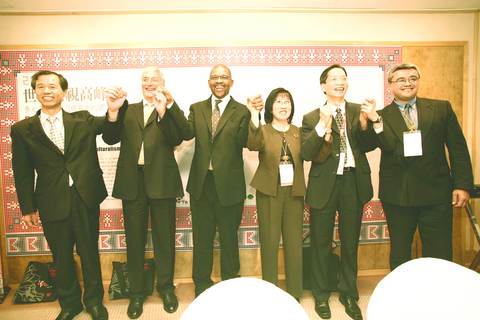Public broadcasters from around the world yesterday participated in a summit on multiculturalism in Taipei and resolved to promote cultural diversity and understanding through the media.
The summit, which attracted more than 25 representatives from 18 countries, was hosted by the local Public Television Service Foundation (PTS) to encourage dialogue between public television leaders and pursue a civil society that is multicultural and free from prejudice and discrimination, PTS chairman Louis Chen (
Chen said that after events such as the Sept. 11 terrorist attacks, the importance of multiculturalism has gradually emerged.

PHOTO: COURTESY OF THE PUBLIC TELEVISION SERVICE FOUNDATION
"We are now a global community," Chen said. "And it is our responsibility as broadcasters to promote cultural diversity and preserve democratic values."
Taiwan has four ethnic groups -- Mainlander, Taiwanese, Hakka and Aboriginal, Chen said, but a fifth group, composed of "new immigrants" or foreign spouses is emerging.
Television programs should integrate multiculturalism and promote better understanding among ethnic groups, he said.
Choi Moon-soon, president of the Munhwa Broadcasting Corp in South Korea, said that since Asians share many cultural traditions public television was a great medium to promote multiculturalism.
Choi said that not only does Taiwan feature South Korean soap operas, but South Korea was also preparing to show Taiwanese television series.
Jean-Bernard Munch, president of public television SRG SSR idee suisse, said that Switzerland has four national languages and has recently seen a rise in new immigrants from other European countries.
"Every country has its own cultural and ethnic situations, and it is hard to find a common solution to the problems," Munch said. "However, the summit's goal is to exchange views and experiences."
Munch said that the task of promoting multiculturalism was not only the responsibility of public television, but also the government's. He added that by ratifying UNESCO's Convention on Cultural Diversity, the government can better promote such values.
Dali Mpofu, the group chief executive of South African Broadcasting Corp, said that South Africa was the youngest democracy among all the participating countries in the summit.
"We come from a past that is characterized by colonization and racial segregation," Mpofu said. With 11 official languages, Mpofu said they are striving, through its three television channels, "to treat each language equally" and ensure that "one group does not overpower the other."
"Without mutual understanding between diverse cultural groups, democracy cannot exist," Mpofu said.
Judy Tam, vice president of Independent Television Service (ITVS) in the US, said that as the world gets smaller and country borders become blurred, the media has the responsibility to educate the public and make society better.
Television programs should provide an opportunity for people to see what is really happening in the country and address issues that are relevant to the public, such as inequality and poverty, Tam said.
Chen also said that editorial guidelines were important for the media to produce fair programs and not to overlook minorities.

An essay competition jointly organized by a local writing society and a publisher affiliated with the Chinese Communist Party (CCP) might have contravened the Act Governing Relations Between the People of the Taiwan Area and the Mainland Area (臺灣地區與大陸地區人民關係條例), the Mainland Affairs Council (MAC) said on Thursday. “In this case, the partner organization is clearly an agency under the CCP’s Fujian Provincial Committee,” MAC Deputy Minister and spokesperson Liang Wen-chieh (梁文傑) said at a news briefing in Taipei. “It also involves bringing Taiwanese students to China with all-expenses-paid arrangements to attend award ceremonies and camps,” Liang said. Those two “characteristics” are typically sufficient

A magnitude 5.9 earthquake that struck about 33km off the coast of Hualien City was the "main shock" in a series of quakes in the area, with aftershocks expected over the next three days, the Central Weather Administration (CWA) said yesterday. Prior to the magnitude 5.9 quake shaking most of Taiwan at 6:53pm yesterday, six other earthquakes stronger than a magnitude of 4, starting with a magnitude 5.5 quake at 6:09pm, occurred in the area. CWA Seismological Center Director Wu Chien-fu (吳健富) confirmed that the quakes were all part of the same series and that the magnitude 5.5 temblor was

The brilliant blue waters, thick foliage and bucolic atmosphere on this seemingly idyllic archipelago deep in the Pacific Ocean belie the key role it now plays in a titanic geopolitical struggle. Palau is again on the front line as China, and the US and its allies prepare their forces in an intensifying contest for control over the Asia-Pacific region. The democratic nation of just 17,000 people hosts US-controlled airstrips and soon-to-be-completed radar installations that the US military describes as “critical” to monitoring vast swathes of water and airspace. It is also a key piece of the second island chain, a string of

The Central Weather Administration has issued a heat alert for southeastern Taiwan, warning of temperatures as high as 36°C today, while alerting some coastal areas of strong winds later in the day. Kaohsiung’s Neimen District (內門) and Pingtung County’s Neipu Township (內埔) are under an orange heat alert, which warns of temperatures as high as 36°C for three consecutive days, the CWA said, citing southwest winds. The heat would also extend to Tainan’s Nansi (楠西) and Yujing (玉井) districts, as well as Pingtung’s Gaoshu (高樹), Yanpu (鹽埔) and Majia (瑪家) townships, it said, forecasting highs of up to 36°C in those areas